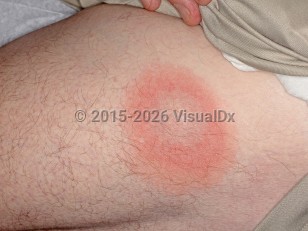Southern tick-associated rash illness
Alerts and Notices
Important News & Links
Synopsis

Southern tick-associated rash illness (STARI) was first described in the mid-1980s in Missouri and the Southeastern United States. It is also known as Southern Lyme disease, lone star tick-vectored Lyme-like illness, and Masters' disease.
STARI is a tickborne syndrome, vectored by the lone star tick (Amblyomma americanum). One case report described the spirochete Borrelia lonestari as the causative agent of STARI, but after extensive research, it has not been reproduced. Therefore, the etiology of STARI has not been confirmed, and this is merely speculation.
The disease is most commonly seen in the Southeastern and South Central United States, where A americanum ticks frequently bite humans. However, these ticks have been identified in areas outside of this range, and cases are being reported in several other regions. This disease should be considered an emerging health threat.
The estimated mean incubation period varies from 6.1 days to 9.2 days. The syndrome is characterized by an erythematous skin lesion with a central clearing, similar to erythema migrans, at the site of a lone star tick bite. These lesions may be single or multiple. Other symptoms include headache, fatigue, and myalgias.
CBC, basic metabolic panel, and liver function tests are usually unremarkable.
Treatment with antibiotics is recommended, and all symptoms resolve with tetracycline or amoxicillin.
Long-term sequelae or life-threatening complications have not been identified to date, but long-term follow-up studies evaluating the outcome following recovery from acute illness are lacking. Bites from A americanum have been associated with the subsequent development of allergies to mammalian meat (eg, beef, pork) in a small number of patients. It is thought that the allergy is mediated by induced immunoglobulin E (IgE) antibodies to alpha-gal (galactose-alpha-1,3-galactose), a mammalian oligosaccharide. Individuals with elevated IgE titers to alpha-gal have experienced urticaria, angioedema, and anaphylaxis symptoms either immediately or 3-6 hours (delayed onset) after ingesting mammalian meat (alpha-gal syndrome). Exactly how the tick bite leads to development of this allergy is unclear. Implicated tick bites have been noted to itch for 2 or more weeks. A blood test for these IgE antibodies exists.
STARI is a tickborne syndrome, vectored by the lone star tick (Amblyomma americanum). One case report described the spirochete Borrelia lonestari as the causative agent of STARI, but after extensive research, it has not been reproduced. Therefore, the etiology of STARI has not been confirmed, and this is merely speculation.
The disease is most commonly seen in the Southeastern and South Central United States, where A americanum ticks frequently bite humans. However, these ticks have been identified in areas outside of this range, and cases are being reported in several other regions. This disease should be considered an emerging health threat.
The estimated mean incubation period varies from 6.1 days to 9.2 days. The syndrome is characterized by an erythematous skin lesion with a central clearing, similar to erythema migrans, at the site of a lone star tick bite. These lesions may be single or multiple. Other symptoms include headache, fatigue, and myalgias.
CBC, basic metabolic panel, and liver function tests are usually unremarkable.
Treatment with antibiotics is recommended, and all symptoms resolve with tetracycline or amoxicillin.
Long-term sequelae or life-threatening complications have not been identified to date, but long-term follow-up studies evaluating the outcome following recovery from acute illness are lacking. Bites from A americanum have been associated with the subsequent development of allergies to mammalian meat (eg, beef, pork) in a small number of patients. It is thought that the allergy is mediated by induced immunoglobulin E (IgE) antibodies to alpha-gal (galactose-alpha-1,3-galactose), a mammalian oligosaccharide. Individuals with elevated IgE titers to alpha-gal have experienced urticaria, angioedema, and anaphylaxis symptoms either immediately or 3-6 hours (delayed onset) after ingesting mammalian meat (alpha-gal syndrome). Exactly how the tick bite leads to development of this allergy is unclear. Implicated tick bites have been noted to itch for 2 or more weeks. A blood test for these IgE antibodies exists.
Codes
ICD10CM:
A69.8 – Other specified spirochetal infections
SNOMEDCT:
444100007 – Southern tick-associated rash illness
A69.8 – Other specified spirochetal infections
SNOMEDCT:
444100007 – Southern tick-associated rash illness
Look For
Subscription Required
Diagnostic Pearls
Subscription Required
Differential Diagnosis & Pitfalls

To perform a comparison, select diagnoses from the classic differential
Subscription Required
Best Tests
Subscription Required
Management Pearls
Subscription Required
Therapy
Subscription Required
References
Subscription Required
Last Updated:04/30/2025
Southern tick-associated rash illness

